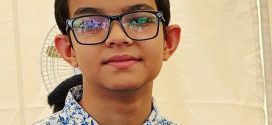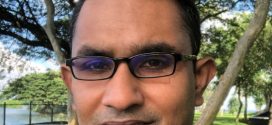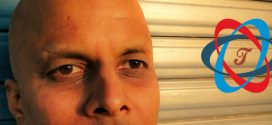Hi Friends,
Allow me to introduce Lidija Stankovikj – the author of – The Outcasts.
Well, she is much more than just being an author of a book. She has done her MBA from the University of Geneva specializing in the management of International Organizations. She has also done MSc in Applied Mathematics. She currently lives in Bangalore (Bengaluru), after having lived in many countries across the world like Macedonia, Switzerland, Sweden, Myanmar (Burma) during various phases of her life.
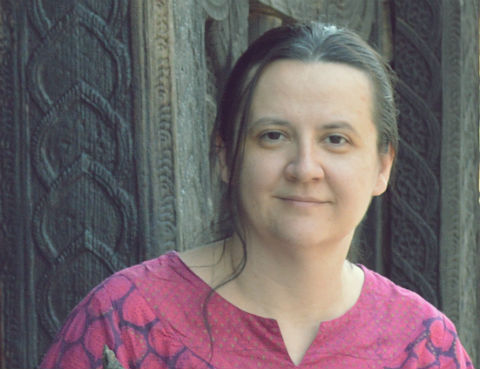
Lidija Stankovikj – The Author Of – The Outcasts
Lidija is quite vocal about contemporary social issues and geographical boundaries don’t bother her. If she came to know about anything which needs to be addressed, she shares her opinion about, without any hesitation. Be it the Transgender citizens’ bill or poverty, she loves to do her bits for the society in the manner she can. And thus, her favorite real-life person whom she admires a lot is – Julian Assange, no wonder! And her favorite literary figures are Kabir, Rumi, Dostoevsky, Kafka, Márquez, Meša Selimović; again no wonder :).
Reading her book – The Outcasts – is an interesting experience. And, we’ve decided to know more about Lidija and her book, mainly the thought-process behind the book. So, we have approached her for an author interview. She is a direct, no-nonsense and polite person; so the things worked out positively. From our team, I got a chance to have a brief Q/A session with her.
Let me share it with you without any delay :).
By the way, before we start, here is the quick link to our unbiased book review for – The Outcasts.
Greetings..!
We are glad to have a conversation with you. Thank you for sparing some time to have a Q/A session with us. Your book “The Outcasts” is getting positive responses in both commercial and critical aspects. Please accept our congratulations for the same. Can you share more details about the response to the book?
Thank you for appreciating ‘The Outcasts’ and for extending this invitation. I put a lot of love and work into creating this book, and with it came the hope that the book would find its way to many readers. The reception and reviews have so far been generous, particularly across book blogs and bookstagram accounts. The book has been appreciated for the style, the social narrative, the inclusion of sub and micro narratives, and for being an emotionally intense read.
A newly minced author – a mathematician – an international development professional with passion for the social pillar of sustainability – a seasoned educator and a lifelong learner.
I was born in Yugoslavia, a country which in the 1990s went through a civil war and consequently ceased to exist, breaking up into several newly established states. I continued to live in the most-southern successor state, Macedonia, where I completed my undergraduate studies and worked as a teacher for several years.
I have been an expat for over ten years now, but I regularly visit my family in Macedonia. Inevitably, I have loosened many bonds with my native country, and nostalgia does occasionally creep in. But I also remind myself that it is always easy to idealize something from either spacial or temporal distance; and so I make myself comfortable wherever I am. Right now, India is my home.
Writing is my creativity field, an opportunity to tell stories and express ideas which are close to my heart, and a medium where I can be vocal with ease.
It came with the realization that some of the most beautiful sites and awe-inspiring places are also soaked in sorrow. That sorrow is innately human, universal, and goes beyond origin and creeds. The idea was to create a book which would not deny this duality, a book which, through its storyline and esthetics, would honor both the beauty and the suffering of the human existence.
That sorrow is also a subtle thread that can bind together individuals who, at first glance, have nothing or very little in common. And so the challenge was to bring together three such protagonists whose only common denominator would be their nonconformism and social exclusion.
The name is the strongest identifier. In many cultures, especially in India, the child’s name is based on social, cultural and religious conventions; it is often considered a determinant of one’s wellbeing and success in life. In many spiritual systems and traditions, the initiate is given a new name as a symbolic discontinuation from the earlier life, and establishment of new identity. With that in mind, I too was fastidious in choosing the ‘right’ names for my protagonists.
Each name was selected for both its etymology and resonance with the character’s life path and circumstances. At the same time, I did not want those names to be deterministic, and I searched for multi-layered names that would also provide space for juxtaposition and word play. For instance, in spite of her proactive stance in life, nothing seems more difficult for Tabassum, the young woman whose name means “smile”, than to feel happy, even content for a brief while. At the same time Tabu, the hypocoristic form of her name, echos her proclivity for challenging norms, patriarchy and social taboos. And somewhere down the story, Tabu forms a subconscious alliteration between her name and the word talaq.
The depth of Santan’s and Chameli’s identities is no less nuanced. I trust the reader to enjoy the literary ambiguity of their names and decode their meaning themselves.
I believe that all fictional characters are reflections of some psychological aspects of the author (either conscious or subconscious). Using Jungian terminology, one could say that even the antihero or the villain carries some of the writer’s shadow – that shunned and unexamined side of the self.
In that sense, writing is a dangerous affair; to a great extent, a sincere author strips their soul naked for the reader. Of course, there are many genres of commercial fiction today, which are meant to offer entertainment, rather than a soul-steering experience.
You have tactfully pointed out a trouble with our modern life preferences. We live in an age of enhanced connectivity, mobility and productivity; we are encouraged to become single-disciplinary, to develop narrow professional specialization; we become increasingly competitive and obsessed with targets. Thus we sacrifice some of our interests, inclinations and passions for that which is more practical and gainful in material terms. We join the proverbial rat race, convinced in our rational decisions. In the process, we become inherently fragmented.
Inevitably, there comes a time when we are reminded of those forgone talents or passions. A personal crisis often serves as a trigger, a chance to reflect and re-assess our choices. Sometimes this comes too late, when we have become to rigid to change. Our inner voice, that signal as you say, is often ignored, and the comfort zone prevails.
I don’t write on topics I am not emotionally invested in. The guiding principle of my writing is empathy; without empathy, writing easily slips into an intellectual or artistic ego trip. Thus for me, writing is both a taxing and a rewarding experience.
I do my research meticulously – I read and I listen to the voices from the ground.
I work on the narrative structure from the early stage, but I prefer developing only the skeleton. I do not plan every chapter, scene and dialogue upfront. I allow my characters to surprise me, and the story to sometimes take a turn I had not anticipated. I refuse to deprive myself of the thrill of seeing the story “write itself”, as long as it does not completely go out of hand and defy the structure.
I do not sleep with a notepad beside my bed; I do not write 1-2 thousand words every day in order to ‘stay in shape’; and I do not professionalize my writing routine in any way. I do not write for a living, I am not pressed by deadlines, and I therefore do my best to enjoy the journey.
The editorial team of Leadstart Publishing took care of the book cover design. In the process of finalizing the cover, I was presented with the shortlisted proposals, and we analyzed them together. My recommendations were well-received and respected by the team.
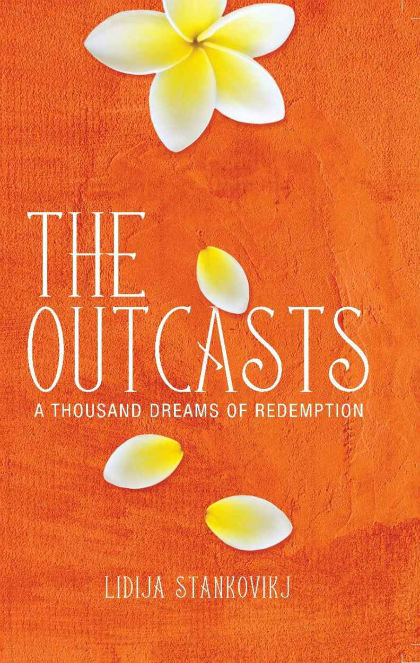
The Outcasts – A Thousand Dreams Of Redemption By Lidija Stankovikj
The Outcasts’ is an intrinsically Indian story, not only in its narrative, but also in its esthetic form and in its cultural underpinning. It was therefore a natural choice to approach Publishers in India with the book proposal. Being both a debut author and non-Indian, I found the barrier to entry almost insurmountable. An increasing number of publishing houses do not accept unsolicited manuscripts; literary agents and publishers often take up to nine months to respond to a submission. I experienced all the pains of an aspiring author: many explicit and implicit rejections (almost half of the book submission mails remained unanswered), a Bangalore Lit-Mart finalist book pitch which lead nowhere, endless browsing through writers’ forums, and a consideration of Amazon’s KDP self-publishing platform, as a last option.
I owe a debt of gratitude to Ms. Chandralekha Maitra, the Head of Editorial from Leadstart Publishing, who put her faith in my manuscript, accepting it to be traditionally published under their premium imprint, the Platinum Press.
There is a home for every book. Finding it does require knocking on one too many doors, but that too is part of the game.
“The Outcasts” is a social novel; the book is a critical take on several societal issues, including gender, superstition, patriarchy, ageism, and poverty. I am an international development professional, and these issues constitute some of the core elements of my academic and professional focus.
On another level, the cultural and spiritual facets of the book are a result of my fascination with – and appreciation of – the incredible diversity which is the very soul of India. This fascination with India’s cultural heritage which began during my adolescent years has obviously permeated my creative side too.
At the same time, I do not subscribe to the ideas of identity politics in literature. I oppose cultural misappropriation in the form of commercialization and misrepresentation, but I disagree with the idea that writers should confine themselves to issues and characters pertinent exclusively to their own gender, racial, social and other identity. Such form of segregation or ghettoization of both the art and the artist not only goes against universality of the human experience, but also destroys the very essence of the artistic expression.
As a neophyte in the world of writing, it taught me to treat the creative process with patience and humility. While I did not struggle with major bouts of writer’s block, I learnt that inspiration is, indeed, a form of grace; discipline helps, but it is in no way a substitute.
Dostoevsky, Turgenev, Yesenin, Selimović, Gibran, Wilde, Camus, Kafka, Marquez, Eco, Rumi, Kabir,…
It is always difficult to select just a few. However, some of my all time favorites are The Prophet by Khalil Gibran, A Hundred Years of Solitude by Marquez, The Stranger by Camus, The Trial by Kafka, Martin Eden by London, The Strange Life of Ivan Osokin by Ouspensky, and both Crime and Punishment and Brothers Karamazov by Dostoevsky.
10 Minutes 38 Seconds In This Strange World by Elif Shafak.
I think it all depends on the genre, target audience and the commercial aspect of the book. Also, the video production should be done with much creativity and professionalism; I have seen many video trailers that look amateurish and do a disservice to the author and the title.
“The Outcasts” is a work of literary fiction, with dominant streaks of social commentary and references to spiritual traditions. This is neither a feel-good book nor a moralistic one. Without mincing words, it aims to provoke and to unsettle, but above all, to entice the reader towards cultivating empathy for the human condition.
I love reading, traveling and photography. One of my hobbies is also the study of Tarot as a collection of archetypal symbols and as a psychological tool for introspection.
I am partial to the smell of printed books. Yet there is nothing more convenient than storing thousands of books on a USB Flash Drive and accessing them at one’s fingertips. So, you could say I am both old-fashioned and practical when it comes to the book format.
Social networks have the capacity to almost instantaneously bring to the forefront voices, both globally and locally. The hashtag activism has managed to not only raise awareness about important issues pertaining to human rights, inequality, environmental degradation, tax evasion by large multinationals etc., but to also mobilize millions of people towards a concrete action. The #MeToo movement, the extinction rebellion campaign, the public shaming of corporates engaged in unethical business practices are just a few examples of the power of social media to engage large number of people on a particular problem. In that respect, the power of social networks is indisputable.
However, the spread of misinformation and fake news is also rampant across the medium. Often issues that go viral are oversimplified or blown out of proportion. There is the problem of so called armchair activism, the disparity between online support for a cause and readiness for concrete action (‘slacktivism’), visible in, for example, Facebook’s change of a user’s profile photo in public support of victims of terrorism or a natural catastrophe. In spite of all that, when it comes to social activism, I believe the benefits outweigh the negative consequences of using social media.
I grew up hearing folktales from all around the world. My maternal grandmother and my father were particularly fond of narrating fairytales and fables; our home library was quite large. Most of these tales did have an ethical/moral thread in their archetypal confrontation of darkness and light, the good and the evil; there was always a sense of purpose in the hero’s/heroine’s pursuit; and justice almost always prevailed. This was universally true, regardless of the country those stories came from. That was, perhaps, the most important message for me.
I continue to be very fond of the work of Campbell, Eliade, Frazer, Jung, who have done amazing work on deconstructing many myths, legends and rituals from anthropological, psychological and spiritual point of view.
We probably do, but it is not necessarily a bad thing. One thing I find particularly problematic with the ‘moral/ethical’ connotations of traditional storytelling is that it also serves as a carrier of outdated social practices and notions, such as patriarchy, traditional gender roles, unchallenged authority, to name a few.
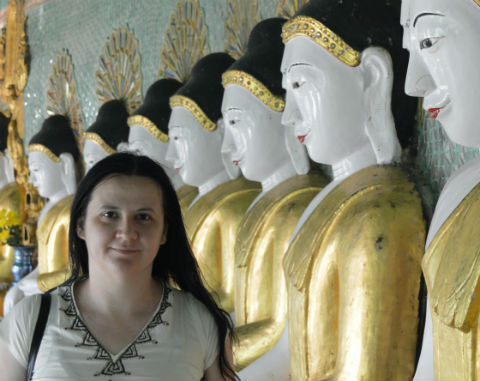
Lidija Stankovikj – The Author Of – The Outcasts
Today, storytelling is as alive as ever. Corporates use storytelling in their communication and marketing strategies. Social activists create movements and mobilize communities using the power of a single story. The few things that have changed are our attention span, the form/medium of the story, and the value systems which reflect the social, political and cultural reality.
I tweet regularly on social issues (education, gender, human rights, sustainability); my Twitter handle is @Lid1108. Professionally, I am an open networker; my LinkedIn profile is: https://www.linkedin.com/in/lidijastankovikj/.
Thank you, Jiten, for devoting space to The Outcasts in ThinkerViews. It is always a pleasure connecting with people and communities of passionate readers and critical thinkers. ThinkerViews is among the most popular book review blogs in
India, and I hope that our conversation will bring The Outcasts closer to more lovers of literary fiction.
Quick Purchase Links:
- Buy Book From Amazon India – Paperback
- Buy Book From Amazon India – Kindle Ebook
- Buy Book From Amazon US – Paperback
- Buy Book From Amazon US – Kindle Ebook
Over To You:
I hope you have enjoyed the Q/A session with her. And many of your questions might be already answered. Let us know that what do you think about this Interview session? Do you want us to ask anything else to heron your behalf? Do let us know. Also, let us know which other authors you like us to interview? Do let us know your thoughts and remarks via comments below. Do not forget to share this article with your friends over various social networks via Twitter, Facebook and others. And yes, you may like to subscribe to our RSS feeds and follow us on various Social networks to get latest updates for the site to land right in your mailbox.
 ThinkerViews – Views And Reviews Personal views and reviews for books, magazines, tv serials, movies, websites, technical stuff and more.
ThinkerViews – Views And Reviews Personal views and reviews for books, magazines, tv serials, movies, websites, technical stuff and more.

